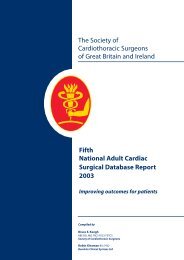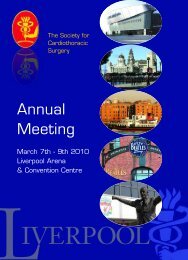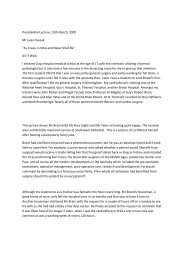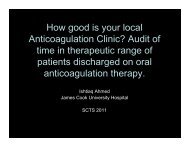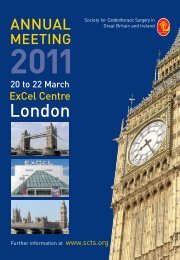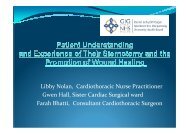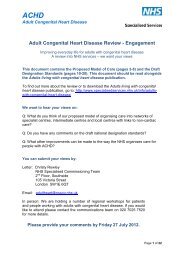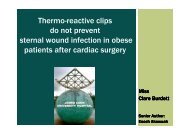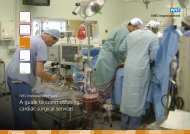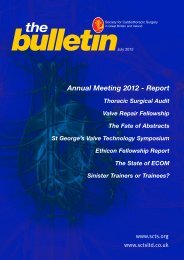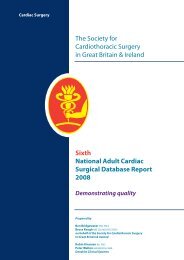Download - Society for Cardiothoracic Surgery
Download - Society for Cardiothoracic Surgery
Download - Society for Cardiothoracic Surgery
You also want an ePaper? Increase the reach of your titles
YUMPU automatically turns print PDFs into web optimized ePapers that Google loves.
July 2010 27<br />
arrangements of their Forum, and they<br />
made very appreciative comments about<br />
their day with SCTS.<br />
Further news on the Department of Health’s<br />
Strategic Commissioning Development<br />
Unit’s work to prepare a commissioning<br />
pack <strong>for</strong> Cardiac Rehabilitation is that a<br />
Preview Event was held in London in May,<br />
with Professor Roger Boyle, National<br />
Director <strong>for</strong> Heart Disease and Stroke, as a<br />
keynote speaker. There is now to be a flurry<br />
of consultations to tidy up the final<br />
proposals and Report <strong>for</strong> publication later<br />
in the year. Always remember in the current<br />
economic climate, that good cardiac<br />
rehabilitation improves mortality and<br />
morbidity and so there are significant<br />
savings to be made by having robust and<br />
comprehensive programmes in place all<br />
across the land. Looking at the biographies<br />
of the members of this commissioning<br />
team, it was surprising to note that I was<br />
the sole representative of the surgical<br />
fraternity.<br />
A Conference to celebrate the Tenth<br />
Anniversary of the National Service<br />
Framework <strong>for</strong> Heart Disease was held in<br />
London in March. It was good to see the<br />
Triumvirate of Sir Bruce Keogh, Professor<br />
Roger Boyle and Dr Mark Dancy, who have<br />
all done so much to lead from the front<br />
throughout the decade, looking so well and<br />
sprightly and not much different to how<br />
they looked all those ten years ago. It was<br />
good <strong>for</strong> me to be invited, and SCTS were<br />
well represented by Steven Livesey, Tara<br />
Bartley and others.<br />
Professor Marjan Jahingiri and I have<br />
served together on committees <strong>for</strong> NICE<br />
and SCTS, but it was still a surprise to be<br />
pressed to talk to Marjan’s team at St<br />
George’s on Cardiac Rehabilitation. It was<br />
an equal surprise that Marjan has these<br />
regular team meetings at 8.00am on a<br />
Tuesday morning. Her team comprises<br />
surgeons, cardiologists, anaesthetists,<br />
nurses and other health professionals.<br />
They all turned out, some in their best<br />
bedside manner clothes, and some in their<br />
greens. In preparation I checked out St<br />
George’s on the Public Portal <strong>for</strong> Cardiac<br />
<strong>Surgery</strong>, on the MINAP Registry, on the<br />
National Audit <strong>for</strong> Cardiac Rehabilitation<br />
and on the SCTS Blue Book. As I revealed<br />
to them what I had found, it was a relief to<br />
discover that a key member of the team,<br />
the Audit Manager, was also present, as<br />
were other key support workers. The<br />
important thing I learned from my visit was<br />
the absolute significance of having a<br />
dynamic whole team approach to our<br />
service, and that here was an example of<br />
best practice in action. What they made of<br />
me I’m not at all sure, but they were<br />
particularly attentive when I touched on<br />
sexual activity and heart patients. So, well<br />
done Marjan and your team, Onwards and<br />
Upwards!<br />
Our thoughts are already turning to next<br />
year’s Annual Meeting in London, and to<br />
continue with our commitment to involve<br />
patients and to hold a Patients’ Forum. We<br />
are equally committed to recruiting more<br />
representation from our thoracic patients<br />
than we have hitherto managed. If any of<br />
you have any ideas as to how this might be<br />
better achieved or if you know of any likely<br />
candidates please let us know, and please<br />
feel free to approach these patients<br />
yourselves.<br />
When I became your Patient<br />
Representative, two years ago in<br />
September, following a searching interview<br />
with Graham Cooper, I was most impressed<br />
with the warmth of the reception I received<br />
from your President, Leslie Hamilton, and<br />
the strength of the support that started to<br />
emanate from the Executive Committee and<br />
others. Now Professor David Taggart is at<br />
the helm and this commitment to patient<br />
participation and involvement shows no<br />
sign of abating. SCTS is pioneering and<br />
leading from the front in these matters, as<br />
in others. Thanks so much <strong>for</strong> all <strong>for</strong> this<br />
support, you will now have a measure of<br />
what can be achieved, let’s keep working<br />
together to make it better.<br />
Norman Briffa MB ChB FRCS(CTh) MD<br />
Consultant <strong>Cardiothoracic</strong> Surgeon, Sheffield Teaching Hospitals NHS trust<br />
Honorary Senior Lecturer University of Sheffield<br />
I hope to use the scholarship to attend a laparoscopy course<br />
organised by the college of surgeons in England, and to spend 2<br />
weeks in each of three centres in Europe where large numbers of<br />
minimally (lesser) invasive heart valve surgery are carried out. These<br />
centres are the Onze Lieve Vrouwziekenhuis in Aalst Belgium, Hopital<br />
Cardiothoracique Louis Pradel in Lyon and one other in Italy. Varied<br />
practice of consultant cardiac surgeons in the UK dictates that very few<br />
surgeons have sufficient numbers of patients requiring isolated heart<br />
valve procedures. I plan to overcome this by making these procedures,<br />
2 consultant procedures – patients could be pooled and 2 experienced<br />
heads at the table do tend to be better than one. These patients, as<br />
do all patients who have undergone heart valve surgery in Sheffield,<br />
will attend a special valve clinic 4-6 months after surgery. They will<br />
have clinical symptoms and signs recorded by dedicated staff, they<br />
will undergo a full echocardiographic examination and they will take a<br />
dedicated follow-up survey (initial one being done in the preop period)<br />
as part of a PROMS exercise in patients undergoing heart valve<br />
surgery. In this way, we can contribute to the hitherto lean body of<br />
knowledge on these methods.<br />
If as hoped a<br />
successful<br />
programme is established in Sheffield, we can turn our attention to the<br />
dissemination of knowledge and experience through training. The aim<br />
of any training programme is to try and eliminate the learning curve.<br />
Although we all have heard about the fantastic achievements of Hugo<br />
Vanermen in Alst, very little is known about the inevitable pain of his<br />
learning curve. The desire to avoid it is undoubtedly another reason<br />
<strong>for</strong> surgical conservatism. I have been very impressed with the<br />
arrangements <strong>for</strong> training in laparoscopic colorectal surgery in the UK.<br />
NICE have recommended laparoscopic resection by a suitably<br />
experienced surgeon as the preferred treatment of colorectal cancer.<br />
NHS cancer money has there<strong>for</strong>e been used to establish a<br />
comprehensive training programme (www.lapco.nhs.uk). It is as far as<br />
I can tell the first of its kind anywhere in the world and if successful<br />
should serve as the perfect role model <strong>for</strong> the teaching and<br />
dissemination of surgical techniques.<br />
I would like to thank the <strong>Society</strong> <strong>for</strong> the award of the Scholarship and<br />
the opportunity this provides.



